M.J. Johnson's Blog, page 19
May 23, 2012
Niedermayer & Hart Competition
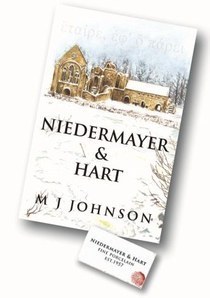 Online Competition
Online CompetitionWin one of five first edition copies of Niedermayer& Hart by M J Johnson (Trade paperback. 448 pages, worth £12.99/approx $20.54). Each copy will be signed by the author and also included will be a limited edition Niedermayer & Hart business card (complete with bloody fingerprint!).
You can read the first fifty pages of the horror/thriller for free on this website - just go to the Niedermayer & Hart page and click Sample the Book from the drop-down menu.
HOW TO ENTER
Find the answers to six questions.
Create a 'word' by taking the first letter from each answer.
(example - What colour is the van in the book's prologue? Answer: white - so letter W)
Now do the same with each of the following six questions:
1) In which East Sussex village does the character Erich Ledermann live?
2) In the stop-motion animation 'A Gripping Tail' which you can watch on the Home page of this website - what is the colour of the cat?
3) Which UK city is the hitch-hiker travelling to in the book's prologue? Watch the filmed prologue to discover the answer on - Niedermayer & Hart -Video of Prologue page.
4) The surname of Jim Latimer's old friend Bob?
5) In the animation 'A Gripping Tail' what food item does the mouse drop when it sees the cat?
6) The first name of one of the main characters? (Clue: originally from Austria. Bigger clue: he's named at the top of page 18).
Send your answers by email to NHcomp@mj-johnson.com (don't forget to include your name).
Competition closes at midnight (UK time) on 29 May 2012. Entries will be accepted from
anywhere in the world. The five winners will be drawn at random from people who have presented the correct single word answer. If you're one of our winners we will contact you by email - your book will then be posted to you shortly afterwards.
Good luck!
Published on May 23, 2012 03:22
May 16, 2012
How I Came to Traditional English Folk via Abba
 Huh?
Huh?No - you read it right - vision's okay!
It's true. The ultimate Spandex clad pop band, the Anti-Christ of traditional music, was largely responsible for introducing me to English Folk. I have to admit that up until then Folk had always conjured up in my mind a bygone age, hand-rolled cigarettes, thick woolly sweaters, hats festooned with gaily
(traditional useage) coloured ribbons, women in long skirts and men in shabby, ragged-arsed jeans.
I believe I've mentioned elsewhere in the pages of this blog that it can be a dangerous thing in my house to express approval for any product or gift item capable of being gift-wrapped, placed beneath a spruce-like tree or can slip nicely into a Christmas stocking. One unqualified yummy sound might produce a ripple effect in my house that could see me eating beans on toast every Saturday lunchtime for a decade (causing a potential ripple effect you'll appreciate in far more ways than one!).
I recall the moment quite clearly. We were driving along (don't actually remember where) when one of Abba's songs came on the radio. I don't recall which one, and I know better than to list the titles of the ones it might have been, or I'll only end up humming along to it for the next seventeen days!
Anyway, this song was on the radio - and perhaps because I was driving and it was a lovely sunny afternoon, I remarked quite casually, "Funny how time works ... it's actually quite enjoyable listening to this ..."
My guard was down, or else I should have immediately retracted the statement and added a disclaimer like, "However, this opinion is totally off the top of my head, and although I've enjoyed listening to this single Abba track, it adequately fulfills my Abba quota for the next decade."
I really should've known better. From that moment on my festive fate was sealed!
There's no real disguising the shape of a CD case and as I drew my pressies together into a pile on Christmas morning I wondered what it might be? The new Norah Jones album, Tracey Chapman, Van Morrison perhaps? Or even an old favourite like James Brown, Ray Charles or Otis?
I admit when I peeled off the packaging I was momentarily lost for words. Abba Gold had not until that moment owned any part of my conciousness. Was I having my leg pulled? I looked
for signs of twinkling around the eye area.
Huh? ... Huh? ... and Huh again!
I quickly covered my tracks, "Abba Gold! That's brilliant!" I lied.
An hour later, unable to remove the cellophane wrapper, fully aware that if I actually lobbed the thing into a CD player I would be doomed to those pop anthems rattling around in my head until the Spring, I 'fessed up. I'd chosen my moment; it was after Christmas lunch, which I'd cooked
(always a good time to approach my wife after a nice meal!)
"That's okay," she said, "I was quite surprised when you said you fancied some Abba!"
I was down the HMV shop as soon as they opened after the holiday. I'd recently caught the last ten minutes of Peggy Seeger's Desert Island Discs on Radio 4 and had been much taken with The Joy of Living sung and written by her late husband Ewan McColl. I came across an album of his called Black and White. It was a complilation album, a kind of "Best of ...". I loved
it and so did Jude as well as our son. Around that time one of Jude's brothers, Jeremy, was discovered to be terminally ill. We visited him regularly throughout his illness and he and his
partner Sandra, who were both quite knowledgeable about folk music, introduced us to singers and bands previously little known or totally unheard of. I recall they had just discovered Karine Polwart and one of her songs in particular became very important to them both throughout that difficult time. We got to know something of Tim Hart and Maddy Prior, Martin Carthy, Dave Swarbrick, Bert Jansch, Annie Briggs, Jake Thackray, John Spiers and Jon Boden, Richard Thompson, Kate Rusby, the Waterson family and dozens more whose names are equally worth a mention.
So you see, gentle reader, out of that scorned copy of Abba Gold I discovered a whole new world of pleasure - it literally opened up my ears. Who knows, perhaps one day I may even open up my mind to Abba.
Huh?
(Coming soon to this blog page - fun competition - to win 5 print copies of Niedermayer & Hart)
Published on May 16, 2012 15:04
May 9, 2012
Dark Matter by Michelle Paver
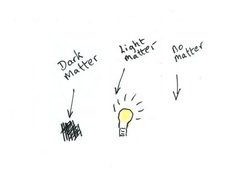 I know Michelle Paver's writing mainly through her children's series Chronicles of Ancient Darkness (Wolf Brother). I don't tend to read a lot of children's fiction but occasionally I find time - this is generally after a strong recommendation has come from my wife, Judy, who reads about three times as fast and therefore puts away about three times the number of books I do in a year and likes to keep up with every possible category that interests her. The Wolf Brother books are terrific, and if I ever find myself in conversation with anyone under the age of twelve I always angle the conversation round to whether or not they've read them. I find it surprising how often kids and their parents have never even heard of the stories. If you know any children with birthdays coming up, I reckon you can't fail to score a hit by introducing them to these great tales about a boy, a girl and a wolf set at the end of the Stone Age.
I know Michelle Paver's writing mainly through her children's series Chronicles of Ancient Darkness (Wolf Brother). I don't tend to read a lot of children's fiction but occasionally I find time - this is generally after a strong recommendation has come from my wife, Judy, who reads about three times as fast and therefore puts away about three times the number of books I do in a year and likes to keep up with every possible category that interests her. The Wolf Brother books are terrific, and if I ever find myself in conversation with anyone under the age of twelve I always angle the conversation round to whether or not they've read them. I find it surprising how often kids and their parents have never even heard of the stories. If you know any children with birthdays coming up, I reckon you can't fail to score a hit by introducing them to these great tales about a boy, a girl and a wolf set at the end of the Stone Age.However, I digress! This blog post is about another piece of writing by Michelle Paver, Dark Matter, her ghost story for adults published in 2010. Personally, I've always been a sucker for a good ghost story. It's definitely not an easy genre to succeed with; I've certainly read
more that didn't quite hit the spot which makes you squirm inside than actually did the trick. That sense of creeping dread that should cause bristling sensations at the top of your cranium and which should be part and parcel of any self-respecting ghost story isn't an easy thing to achieve or sustain.
Michelle Paver shows her command over the written word by racking-up the tension to an almost unbearable pitch before she finally hits us with the inevitably horrible denoument. She has clearly taken a good hard look at the genre, studied and understood the ghost story's form before presenting this tale to her readers. The story has the psychological undertones which are generally present in the best ghostly tales, with a main character who's appropriately on edge from the very start. She has managed to set the book in a period and place (an Arctic expedition in 1937) that perfectly achieves the isolation desirable for kick-starting the imagination into all kinds of feverish contortions. I don't go in for spoiling plots, so you'll have to read it if you want to find out what happens, how and why.
If, like me, you're partial to sitting safely in a comfortable chair by a nice warm radiator reading
something that has the ability to cause an icy twinge to run along your spine from time to time, then you'll almost certainly enjoy this book.
Published on May 09, 2012 14:04
May 2, 2012
Family Ties
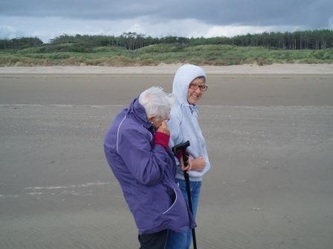
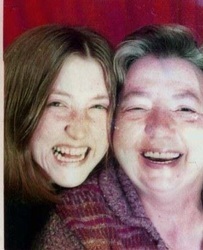
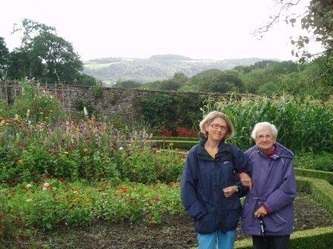 They say nothing prepares you for certain experiences in life. Parenthood and bereavement are the examples that immediately spring to mind. When you reach my age it's likely you will have experienced both. I am pleased to say the first was a blessing and a joy, the second not so welcome but an inevitable part of the bitter/sweet nature of life. Those of you who follow me on Twitter may know that I recently visited my home town, Gorseinon, in Wales. I visit my mother regularly, roughly every six weeks or so, generally for three or four days at a time. My wife and son have been supportive too and they often either come along or visit independently - it certainly makes the long drive more palatable to have a companion. I'm pleased to say I've managed to maintain this since shortly after my father died eighteen years ago. My mother has always been very brave and stoical and although she annoys me at times (hey, she's my Mam!) I most certainly admire her a great deal too.
They say nothing prepares you for certain experiences in life. Parenthood and bereavement are the examples that immediately spring to mind. When you reach my age it's likely you will have experienced both. I am pleased to say the first was a blessing and a joy, the second not so welcome but an inevitable part of the bitter/sweet nature of life. Those of you who follow me on Twitter may know that I recently visited my home town, Gorseinon, in Wales. I visit my mother regularly, roughly every six weeks or so, generally for three or four days at a time. My wife and son have been supportive too and they often either come along or visit independently - it certainly makes the long drive more palatable to have a companion. I'm pleased to say I've managed to maintain this since shortly after my father died eighteen years ago. My mother has always been very brave and stoical and although she annoys me at times (hey, she's my Mam!) I most certainly admire her a great deal too. Dad died under unfortunate circumstances. He'd had a duodenal ulcer for over twenty years which was kept in check with medication. He had been feeling particularly unwell, experiencing some pain and a high temperature, and my mother called out the doctor. Unfortunately their regular GP was unavailable and another partner in the practice came out. Despite having access to my father's medical history and my mother questioning the diagnosis, he pronounced that my father had pleurisy. He prescribed some pills and told my parents that it would be at least three days before they took effect, and that there would be no point in contacting him again until then. My parents were of a generation where authority is rarely challenged and by the time (three days later) they called the surgery again, my father was in a great deal of pain and a lot sicker. It was Dad's old doctor who visited this time I believe, and he immediately and correctly diagnosed a perforated ulcer. I drove down overnight with my son who wasn't quite thirteen at the time. I had woken him in the middle of the night on receiving the call from my mother to say that Dad had just gone into surgery. Our son was incredibly close to his grandfather (Dycu, as he called him) and I didn't want to leave for Wales without giving him the option of coming with me. His response was immediate and unequivocal. I think there may have been some criticism of this in some quarters. My wife and I had talked it over, and we both have strongly held convictions about not sheltering children completely from life's troubles. Even so, I was never a hundred percent certain if it had been the correct thing to do. So I asked him last year whether we'd made the right choice. He looked rather taken aback that I'd even bothered to ask. "Of course it was," he said, and then went on to tell me how the experience had he felt informed his life in some way. I was grateful to hear this.
The forty hours in intensive care was a difficult ordeal for everyone and when my father died he was surrounded by his immediate family. I'll never forget how the sensation of oppressive gloom dissipated almost immediately in the moments following his death. My son wasn't present at the time of death, that would have been too much for him to bear. He was outside with his mum, who had travelled down as soon as she'd been able to make arrangements for our dog and two cats. It was my mother, on his request, who took him in to say his last goodbye to his 'Dycu'. Some days later my mother's GP called in to tell her how very sorry he was to hear about 'Dan' as he called him. He went on to apologise for his colleague's diagnosis. According to my mother he repeated several times, "I don't know what he was thinking ... he must have seen Dan's notes." My mother accepted that a terrible mistake had been made but didn't consider for a moment making any accusations of incompetence or malpractice. A short while later the doctor in question tragically took his own life. There had apparently been other mistakes I believe which must have preyed on the poor man's mind.
In the long years after my father's death my mother managed to keep herself going by joining various art classes, and took advantage of her free bus pass to visit friends and family in her birthplace of Aberdare. We spent a week or two with her every summer and as she grew older we switched from visiting her at Christmas to her coming up to us in Kent. Then, just under two years ago, unquestionably due to her diminishing eyesight, she had a fall which led to her
requiring a hip replacement. It's quite a big operation for someone in their mid-eighties to bear and the ordeal took its toll. While she was convalescing over many months in hospital my wife did some research and found a sheltered housing scheme close to her home. We were very fortunate to get her a place there a short while later.
Which brings me back to the start of this blog post and what I was doing in Wales last week: the final clear-out of my mother's little bungalow, the place I moved to when I was twelve and which part of me always thinks of as 'home' or with more potency in Welsh 'cartref' - even though home has been somewhere quite different for a very long time. I stayed for nearly a month at the beginning of 2011 when my mother moved out and into her sheltered accommodation and sorted through a great deal of old stuff: my father's wartime letters from India to his sweetheart (as Mam was from age fourteen), literally dozens of photograph albums, my father's suits still hanging in the wardrobe and drawers full of all kinds of memorabilia of no remunerative value, but which often had the power to turn me into a blubbering wreck, like some passages my mother had underlined in a self-help book and the tariff card from the hotel where my parents stayed the night before our wedding kept in pristine condition in my father's wallet.
Nothing can ever really prepare you for the emotional cross-currents awaiting you when you dismantle a family home. it's a bit like gazing back over your shoulder at your childhood and adolesence whilst at the same time staring ahead at the shortening perspective of your own mortality.
Published on May 02, 2012 15:50
April 18, 2012
A Seventies Double-Bill
I recall my father-in-law being almost struck dumb when my wife asked him once who A E Matthews was. "You mean to say you've never heard of A E Matthews?" he asked in his dulcet tones after he'd recovered somewhat. I didn't know who the bloke was either but I wasn't saying anything! I supposed this was what they meant when people talked about the generation gap. I imagine my son's contemporaries will be equally surprised when they are asked one day, "Who is Will Ferrell?" or whether Justin Timberlake is a ski resort?
Recently, my wife and I have enjoyed something akin to a Mel Brooks retrospective. Not the later stuff when his work lost any of its earlier subtlety and Mel (oh dear!) began to appear in his own movies; the brilliantly inventive sometimes pantomimic earlier stuff. Finest of all in my view being The Producers with its unashamedly theatrical script and larger than life performances. However, I suppose the two movies that really captured the comic zeitgeist and tickled the funny-bone of the seventies and my generation were Blazing Saddles and Young Frankenstein. These two were probably the Anchorman and Dodgeball of their day. I saw them together and in various double-bills across London as a student and later - VHS being nothing more than a twinkle in someone's eye at the time and DVD was far-far-away in fairyland.
My son (weaned on The Producers and Young Frankenstein) showed the 'wind-breaking' clip from Blazing Saddles to some friends of his recently who had never seen it before. "You mean to say they'd never seen ..." I heard myself begin to cry-out. I had reached an A E Matthews crossroads in my life!
I just watched the farting scene from Blazing Saddles myself a minute ago and although I've probably seen the thing a dozen or more times it still makes me laugh - see what you think -
As for Young Frankenstein, far as I'm concerned almost every scene is a jewel. Both films star the wonderful Gene Wilder and bubble with the magnificent comic ebullience of Madeline Khan. All the performances are terrific throughout both films but Y F has the advantage of Marty Feldman, Kenneth Mars, Peter Boyle, Teri Garr, Cloris Leachmann and an unforgettable (and almost unrecognisable too) performance as a blind old peasant from Gene Hackman. To single out a scene is nigh on impossible - this, for me, is film comedy at its very best. Take a look
at the moment when Dr F arrives in Transylvania and meets Egor (Igor actually) for the first time - Enjoy!
Recently, my wife and I have enjoyed something akin to a Mel Brooks retrospective. Not the later stuff when his work lost any of its earlier subtlety and Mel (oh dear!) began to appear in his own movies; the brilliantly inventive sometimes pantomimic earlier stuff. Finest of all in my view being The Producers with its unashamedly theatrical script and larger than life performances. However, I suppose the two movies that really captured the comic zeitgeist and tickled the funny-bone of the seventies and my generation were Blazing Saddles and Young Frankenstein. These two were probably the Anchorman and Dodgeball of their day. I saw them together and in various double-bills across London as a student and later - VHS being nothing more than a twinkle in someone's eye at the time and DVD was far-far-away in fairyland.
My son (weaned on The Producers and Young Frankenstein) showed the 'wind-breaking' clip from Blazing Saddles to some friends of his recently who had never seen it before. "You mean to say they'd never seen ..." I heard myself begin to cry-out. I had reached an A E Matthews crossroads in my life!
I just watched the farting scene from Blazing Saddles myself a minute ago and although I've probably seen the thing a dozen or more times it still makes me laugh - see what you think -
As for Young Frankenstein, far as I'm concerned almost every scene is a jewel. Both films star the wonderful Gene Wilder and bubble with the magnificent comic ebullience of Madeline Khan. All the performances are terrific throughout both films but Y F has the advantage of Marty Feldman, Kenneth Mars, Peter Boyle, Teri Garr, Cloris Leachmann and an unforgettable (and almost unrecognisable too) performance as a blind old peasant from Gene Hackman. To single out a scene is nigh on impossible - this, for me, is film comedy at its very best. Take a look
at the moment when Dr F arrives in Transylvania and meets Egor (Igor actually) for the first time - Enjoy!
Published on April 18, 2012 12:38
April 12, 2012
Lucky Seven Blogging Fun!
Author Tom Quigley @TQuigley_Writer sent me this interesting challenge on Twitter. Lucky 7 is meant to be a fun exchange between indie authors. I've personally never done anything like this before, so here goes and I hope I've done it correctly - hope the instructions haven't got all messed-up like a game of Chinese Whispers!
The rules:
Go to page 7 or 77 of your current manuscript.
Go to line 7.
Post on your blog the next 7 lines, or sentences as they are - no cheating!
Tag 7 other authors to do the same.
Here is my seven line extract from page 7 of Roadrage (coming out shortly)
... Somehow the situation had Spike caught in its grip too. He was rushing to and fro, barking with unaccustomed ferocity, one second at the windscreen, the next at the passenger window. Uncontrollable frenzy had seized the moment and the deafening noise coming from the dog provided an aptly manic soundtrack.
The milometer needle passed eighty, eighty-five, ninety. At each of these stages Gil looked across his shoulder to see if his pursuer had given up. There was no change. Ninety-five, a hundred, a hundred and five; his persecutor was right beside him. Gil was beginning to feel a loss of control in the steering as the wheels found it increasingly difficult to gain purchase on the wet surface ...
Finally, I have to pass Lucky Seven on to seven more authors (I hope they'll appreciate the gesture!)
The next seven are:
K J Waters @kamajowa
Clive S. Johnson @Clive_SJohnson
Kelly @caillte_inion
S.L.Pierce @piercebooks
Jane Isaac @JaneIsaacAuthor
Barbara Towle @BarbaraTowle
Cheryl Youngman @CherylYoungman
Good luck to all!
The rules:
Go to page 7 or 77 of your current manuscript.
Go to line 7.
Post on your blog the next 7 lines, or sentences as they are - no cheating!
Tag 7 other authors to do the same.
Here is my seven line extract from page 7 of Roadrage (coming out shortly)
... Somehow the situation had Spike caught in its grip too. He was rushing to and fro, barking with unaccustomed ferocity, one second at the windscreen, the next at the passenger window. Uncontrollable frenzy had seized the moment and the deafening noise coming from the dog provided an aptly manic soundtrack.
The milometer needle passed eighty, eighty-five, ninety. At each of these stages Gil looked across his shoulder to see if his pursuer had given up. There was no change. Ninety-five, a hundred, a hundred and five; his persecutor was right beside him. Gil was beginning to feel a loss of control in the steering as the wheels found it increasingly difficult to gain purchase on the wet surface ...
Finally, I have to pass Lucky Seven on to seven more authors (I hope they'll appreciate the gesture!)
The next seven are:
K J Waters @kamajowa
Clive S. Johnson @Clive_SJohnson
Kelly @caillte_inion
S.L.Pierce @piercebooks
Jane Isaac @JaneIsaacAuthor
Barbara Towle @BarbaraTowle
Cheryl Youngman @CherylYoungman
Good luck to all!
Published on April 12, 2012 09:52
April 2, 2012
Morgue Drawer Four by Jutta Profijt
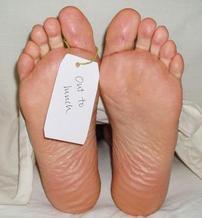 Whoever thought they'd like a book entitled Morgue Drawer Four?
Whoever thought they'd like a book entitled Morgue Drawer Four?I belong to an online bookclub, two actually, although I'm probably more active in one than the other. It's great for keeping up with what's currently out there in the realms of crime, murder and mystery. Belonging to a bookclub is also a nice way to stay connected to other human beings who often, though not always, share similar tastes to mine. I often spend many hours each day
working alone and these connections have become increasingly important to me. Don't get me wrong, there's no substitute for taking a coffee with a real-live pal.
I'd heard the book mentioned some weeks ago in the bookclub and thought the description sounded interesting:
Dr Martin Gänsewein works as a coroner in a Cologne Morgue. Martin, a shy, diligent man who wears a duffle coat, is respectful and thoughtful of women, drives a 2CV, is one day shocked to hear one of the subjects he is performing an autopsy on, speak to him. The ghost is a small time car thief called Pasha who discovered himself suddenly murdered by an assailant he didn't actually see. Pasha assumes that he is still hanging round the earth until his murderer is brought to justice and only then can his soul find peace. None of this is either new or original but then what is? It is definitely the tense relationship between these two very different characters that actually makes the book work. The friction between the high-idealed, conscientious Martin trying to cope and hold his own against the brash and highly abrasive, politically incorrect views of Pasha, who is also the book's narrator makes for great
entertainment. You get the feeling the author is having a lot of fun, and although we feel sympathy for Martin and
the 'pond life' he is forced into putting up with, the book's darkest pleasure often comes from observing the dreadful things Pasha does to Martin in order to get him to comply with his aims.
However, it isn't just a one-way exchange, and there is more to this developing relationship. I particularly enjoyed the way the noble Martin affects Pasha, who quite rightly has occasion to feel ashamed of himself and makes an effort to
improve eg by using less coarse language - of course, always taking the trouble to tell us what he might have said if he hadn't been trying to better himself. The crime and its solution take second place to the relationship between the two main characters. I personally did not have a problem with this.
The book has been translated from German, on the whole quite well, although occasionally a word or phrase stuck out as the kind of choice only a non-native speaker would make. However, the translation is eminently readable and the book certainly flows and has a good pace. If you're looking for a weekend read that's unchallenging, good-natured fun, then you may enjoy this. I certainly did. I'll be keeping an eye open for the next in the series.
Published on April 02, 2012 13:11
March 29, 2012
Stars Turn Out For Movie Premiere
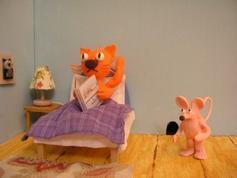 Early rehearsals on set of A Gripping Tail After months of preparation and some difficulties during shooting, production has finally finished on A Gripping Tail - Niedermayer & Hart.
Early rehearsals on set of A Gripping Tail After months of preparation and some difficulties during shooting, production has finally finished on A Gripping Tail - Niedermayer & Hart. Director Tom Johnson, who was at times under great pressure to bring the production in on budget said, "The personality clashes that were reported between cast members in the tabloids and in the kind of magazines I always read at the hairdressers were greatly over stated. Yes, it's true, we went through a few rocky patches, and yes, there were some tantrums on set, but I relished the challenge of working with such talented professionals."
Published on March 29, 2012 04:59
March 21, 2012
Close Shave with a Mobile
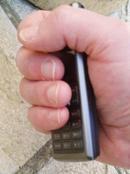 The actor Richard Griffiths has been known to instruct people to kindly leave the theatre when their mobile phones have gone off during performances. It happened at the National after someone's phone went off (an unforgiveable) six times during a performance of 'History Boys' and he apparently kicked a woman out of a matinee at Wyndham's the following year. "Good on yer!" was my cry. Indeed I was always one hundred percent in agreement. How dare these people be so inconsiderate and wreck the enjoyment of others!
The actor Richard Griffiths has been known to instruct people to kindly leave the theatre when their mobile phones have gone off during performances. It happened at the National after someone's phone went off (an unforgiveable) six times during a performance of 'History Boys' and he apparently kicked a woman out of a matinee at Wyndham's the following year. "Good on yer!" was my cry. Indeed I was always one hundred percent in agreement. How dare these people be so inconsiderate and wreck the enjoyment of others!At least this was my view until I went to Oberammergau in 2010 to see the Passion Play. My wife works for a travel company which was running a tour there. They had received a couple of last minute cancellations and her boss very kindly offered us the places. I'd first heard about the Passion Play as a teenager when a friend's mother went off to see it. The whole idea of it sounded incredible. The Passion of Christ performed by the people of a small Bavarian village every ten years (with a few breaks for World Wars) since 1664 as a kind of contract with God for saving them from plague. It was an opportunity that couldn't be missed.
I may relate some of the eventful stuff that happened to us during our journey there in another
blog. However, this is about mobile phones and the lesson of humility. The play was not a disappointment. We had the most incredible seats just two rows from the stage (a fact which, if the terrible thing I'm about to relate had actually happened, would have made matters far worse). The performance lasts for over five hours and there is a break in the middle for an evening meal. The weather was changeable that day, but the afternoon was sunny so I'd taken no coat and I'd left my mobile at the hotel. After supper there were some dark clouds about,
so before we walked back to the theatre I went to our room and picked up my rain jacket. The evening was still mild so I didn't put it on.
The thing you should know about Oberammergau is the devotion of the audience who come to see the play. Their visit is almost an act of religious worship in itself, a pilgrimage. I wouldn't describe either my wife or myself as religious types, however we both hold spiritual beliefs, and I have to say, when the actor playing Jesus first rode onto the stage on a donkey amidst a huge crowd of local men, women and children bearing palm leaves I felt a great lump of emotion in my throat. Those childhood Sunday School classes in Wales had left their mark. For some members of the audience it is such a powerful event though, that it is as if the story is unfolding in real time before their very eyes, and at moments they are literally moved to weeping. The emotional content increases of course as Jesus is brutally scourged and then nailed with powerful artifice to the cross. Even an atheist would find it hard to remain untouched by the sheer human drama and suffering of the story.
It was perhaps half an hour from the play's end, and beginning to feel a bit chilly, when I reached for my rain jacket. At first I couldn't make out what the small rectangular shape was in its pocket. In the next instant, as reality dawned on me, I broke out into a cold sweat, felt panic, horror,alarm, palpitations and terror, all at once. I was suddenly Wile E Coyote at the moment when he realises he's just stepped off the cliff edge and it's a heck of a long drop to the base of the canyon. Although I immediately switched the (eek!) live phone off, for the rest of the play I remained in a state of shock. I can only reflect on how lucky I was. A miraculous escape from
everlasting shame. If the phone had gone off during those two hours when I remained totally oblivious to its presence, for one night only, Judas Iscariot would have come in second for the title Most Despised Person in the House.
Anyway, after this you'll appreciate that I don't feel quite the same amount of vitriol and justified
anger when it comes to the odd mobile phone going off in public. Before I give way to shaking my head and tut-tutting I receive an instant flashback to that night in Oberammergau.
Yikes! My blood runs cold even now as I think of it.
Published on March 21, 2012 14:00
March 12, 2012
David Hockney RA: A Bigger Picture
I went along yesterday to see the David Hockney Show at the Royal Academy. I'd seen colections of Hockney paintings before but never anything like this; so many works on display and on such a massive scale. The whole thing took us well over two hours to go round but believe me the leg ache was well worth it. The majority of the paintings are his response to the landscapes of Yorkshire where he originates from. A large amount of the works have been painted from memory or from initial sketches which the artist further developed in his studio.
The thing that immediately strikes the observer is of course the scale and sheer exuberance of the paintings; the power and vibrancy of the bursts of colour he employs is jaw dropping. At first the canvases appear to be fairly naive efforts with large daubs of paint used to create something vaguely representive of nature. Only by looking again, gazing deeper, becoming attuned to the artist's eye do we begin to see the underlying complexity. He is making us
reconsider our relationship with the natural world. Incidentally, any human presence in these paintings is implicit. Yet we are almost always visible by our efforts to shape the landscape, hedgerows and paths, tracks through woods, hay bales spread out along fields, sometimes a building or the occasional parked-up vehicle.
He seems to be letting us know that we are taking far too much for granted, encouraging us to take another look. Telling us that we've all been mesmerised by our kindergarten teachers, that a thick brown stump with a large green head resembling broccoli isn't all there is to a tree. Hockney makes us re-examine and question exactly what we are seeing, is a tree trunk really brown, a leaf merely green, and could a muddy path actually be a purple aisle through a
cathedral vibrant with colour? Some of the paintings are so vast and their impact upon the eye so dynamic their subject matter seems rather unfamiliar and perhaps quite unrepresentative at first. I am thinking here of the paintings of hawthorn hedgerows and trees in blossom which might pass as designs for an alien landscape in a sci-fi movie. Yet this is our own world, we're just not seeing it.
Hockney has never been afraid to embrace new technology. After all, the pencil was new technology once. A large number of the works were made using an ipad, and at first I wasn't sure whether I liked them, perhaps I'm still not one-hundred percent certain, but he most certainly mastered the device and the technique of using it. However I felt these worked better on a smaller scale and often became blander as the prints increased in size. Still worth seeing though. 'A bigger picture', the show's motif, generally achieves what it is aiming for, and the massive multi-screen with its projected images of woodlands and dancers at work somehow explains visually what Hockney is trying to achieve far better than I am able to with words.
As I walked enthralled through the exhibition yesterday, I was reminded of a quote from William Blake, "The tree which moves some to tears of joy is in the eyes of others only a green thing which stands in the way."
If you get an opportunity to go, I strongly recommend it.
The exhibition runs at the Royal Academy of Arts, London until 9 April.
The Guggenheim Museum, Bilbao 14 May - 30 September.
Museum Ludwig, Cologne 27 October 2012 - 4 February 2013.
The thing that immediately strikes the observer is of course the scale and sheer exuberance of the paintings; the power and vibrancy of the bursts of colour he employs is jaw dropping. At first the canvases appear to be fairly naive efforts with large daubs of paint used to create something vaguely representive of nature. Only by looking again, gazing deeper, becoming attuned to the artist's eye do we begin to see the underlying complexity. He is making us
reconsider our relationship with the natural world. Incidentally, any human presence in these paintings is implicit. Yet we are almost always visible by our efforts to shape the landscape, hedgerows and paths, tracks through woods, hay bales spread out along fields, sometimes a building or the occasional parked-up vehicle.
He seems to be letting us know that we are taking far too much for granted, encouraging us to take another look. Telling us that we've all been mesmerised by our kindergarten teachers, that a thick brown stump with a large green head resembling broccoli isn't all there is to a tree. Hockney makes us re-examine and question exactly what we are seeing, is a tree trunk really brown, a leaf merely green, and could a muddy path actually be a purple aisle through a
cathedral vibrant with colour? Some of the paintings are so vast and their impact upon the eye so dynamic their subject matter seems rather unfamiliar and perhaps quite unrepresentative at first. I am thinking here of the paintings of hawthorn hedgerows and trees in blossom which might pass as designs for an alien landscape in a sci-fi movie. Yet this is our own world, we're just not seeing it.
Hockney has never been afraid to embrace new technology. After all, the pencil was new technology once. A large number of the works were made using an ipad, and at first I wasn't sure whether I liked them, perhaps I'm still not one-hundred percent certain, but he most certainly mastered the device and the technique of using it. However I felt these worked better on a smaller scale and often became blander as the prints increased in size. Still worth seeing though. 'A bigger picture', the show's motif, generally achieves what it is aiming for, and the massive multi-screen with its projected images of woodlands and dancers at work somehow explains visually what Hockney is trying to achieve far better than I am able to with words.
As I walked enthralled through the exhibition yesterday, I was reminded of a quote from William Blake, "The tree which moves some to tears of joy is in the eyes of others only a green thing which stands in the way."
If you get an opportunity to go, I strongly recommend it.
The exhibition runs at the Royal Academy of Arts, London until 9 April.
The Guggenheim Museum, Bilbao 14 May - 30 September.
Museum Ludwig, Cologne 27 October 2012 - 4 February 2013.
Published on March 12, 2012 12:56



